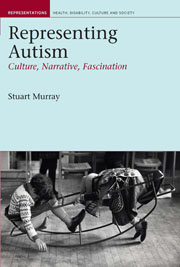Book contents
- Frontmatter
- Contents
- List of figures
- Permissions
- Preface: questions
- Introduction: autism and narrative
- 1 Presences: autistic difference
- 2 Idiots and savants
- 3 Witnessing
- 4 Boys and girls, men and women
- 5 In our time: families and sentiments
- Conclusion: causing/curing/caring
- Acknowledgements
- Select bibliography
- Index
3 - Witnessing
- Frontmatter
- Contents
- List of figures
- Permissions
- Preface: questions
- Introduction: autism and narrative
- 1 Presences: autistic difference
- 2 Idiots and savants
- 3 Witnessing
- 4 Boys and girls, men and women
- 5 In our time: families and sentiments
- Conclusion: causing/curing/caring
- Acknowledgements
- Select bibliography
- Index
Summary
If looking for autism – the processes of assessment and diagnosis – is complex, then looking at autism – seeing it in the world – is equally a far from straightforward activity. As a condition that does not automatically signal its presence, and unlike certain other disabilities, autism can go unnoticed, inhabiting an invisibility. Even the most pronounced cases of autistic behavioural difference do not involve a continual visual signification of disability. Individuals with autism can, and do, involve themselves daily in activities in which their difference goes unrecognized, a form of passing in the majority world. At the same time, autism can provoke sudden, seemingly inexplicable, behaviour that is highly physical and visual. From tantrums to self-harm, and from playful vocalization to pleasurable acts of physical repetition, autism can be an eruptive force, and – as a consequence – one that invites the gaze of onlookers. And, of course, in thinking through the issues of such gazing, we realize that the processes of looking for and at autism combine. Clinical diagnosis is necessarily an evaluative process: it requires the person under evaluation to be the subject of methods and procedures that have looking at their centre. The knowledgeable assessment in the hospital is not the glare caused by ‘misbehaviour’ in the shopping centre, but they share a common thread. To be autistic is often to be the subject of number of different kinds of stares.
- Type
- Chapter
- Information
- Representing AutismCulture, Narrative, Fascination, pp. 104 - 138Publisher: Liverpool University PressPrint publication year: 2008



